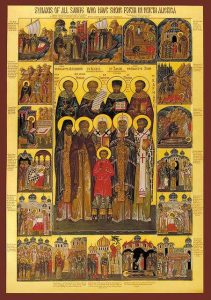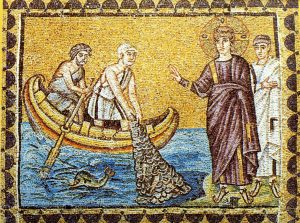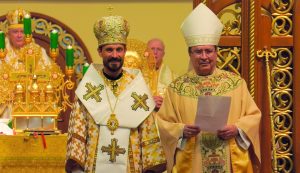![]() Read Romans 6:11-17; Matthew 8:14-23
Read Romans 6:11-17; Matthew 8:14-23
“When it was evening, they brought [Jesus] many who were possessed by demons, and he drove out the spirits by a word and cured all the sick” (Matthew 8:16).
Our Lord came into this world to confront sin and evil directly, and to release us from slavery to sin that we might live in the freedom of faith. This is the promise of Jesus, “ ‘If you remain in my word, you will truly be my disciples, and you will know the truth, and the truth will set you free.’” (John 8:31-32). We have a misconception of freedom, we think it means the ability to do whatever you want, but it actually the power to become a child of God and to live in his love. There is a cost, it means commitment to Jesus, it means setting aside what we think are our needs, as the Lord challenges someone not yet willing to make that complete commitment, “Another of his disciples said to him, ‘Lord, let me go first and bury my father.’But Jesus answered him, ‘Follow me, and let the dead bury their dead’” (Matthew 8:21-22).
St. Paul explains that this is a choice we must freely make, “Do you not know that if you present yourselves to someone as obedient slaves, you are slaves of the one you obey, either of sin, which leads to death, or of obedience, which leads to righteousness? (Romans 6:16)” The reality, however, is that it is the choice of life or death, “Consequently, you too must think of yourselves as being dead to sin and living for God in Christ Jesus” (Romans 6:11). Christ is life, and life is freedom.
Meditation by Archpriest David Petras
 Read: Romans 5:1-10. What does mercy really mean. God reveals himself as mercy. When Moses asks to see God, God responds: “The Lord came down in a cloud and stood with him there and proclaimed the name, “Lord.” So the Lord passed before him and proclaimed: The Lord, the Lord, a God gracious and merciful, slow to anger and abounding in love and fidelity.”
Read: Romans 5:1-10. What does mercy really mean. God reveals himself as mercy. When Moses asks to see God, God responds: “The Lord came down in a cloud and stood with him there and proclaimed the name, “Lord.” So the Lord passed before him and proclaimed: The Lord, the Lord, a God gracious and merciful, slow to anger and abounding in love and fidelity.” The feast of All Saints of Russia was first celebrated in the sixteenth century, but it soon fell into disuse, except by the Old Believers. It was revived at the Council of 1917-1918. Perhaps we would feel that this is a feast of “nationalistic pride,” for indeed, we celebrated the Feast of All Saints last Sunday, and all Christians, in all times and places, are called to holiness, to live in the grace of the Spirit, to work to bring all into union with God. However, perhaps it is also good to remind ourselves that people can be holy in all eras and cultures, and that there are so many saints walking among us in our own nation and times. In recent decades, many feast of the saints of a particular place or culture have been established – All Saints of Mt. Athos, All Saints of England, All Saints of Greece, All Saints of Carpatho-Russia, and so forth.
The feast of All Saints of Russia was first celebrated in the sixteenth century, but it soon fell into disuse, except by the Old Believers. It was revived at the Council of 1917-1918. Perhaps we would feel that this is a feast of “nationalistic pride,” for indeed, we celebrated the Feast of All Saints last Sunday, and all Christians, in all times and places, are called to holiness, to live in the grace of the Spirit, to work to bring all into union with God. However, perhaps it is also good to remind ourselves that people can be holy in all eras and cultures, and that there are so many saints walking among us in our own nation and times. In recent decades, many feast of the saints of a particular place or culture have been established – All Saints of Mt. Athos, All Saints of England, All Saints of Greece, All Saints of Carpatho-Russia, and so forth. What does it mean to be a saint? Our Lord said, “I am the way, the truth and the life” (John 14:6). To be a saint, then, means to follow Jesus the Way, the true path to union with God and holiness. To be a saint is not a luxury for the few, but the necessity for all of us who want to know the truth, to live in Christ. In today’s Gospel, Jesus calls Peter and Andrew and John and James, and they IMMEDIATELY follow him. This call is given to us all. We have been meditating on Pope Francis’ Apostolic Exhortation, Gaudete et Exsultate – Rejoice and Exalt!
What does it mean to be a saint? Our Lord said, “I am the way, the truth and the life” (John 14:6). To be a saint, then, means to follow Jesus the Way, the true path to union with God and holiness. To be a saint is not a luxury for the few, but the necessity for all of us who want to know the truth, to live in Christ. In today’s Gospel, Jesus calls Peter and Andrew and John and James, and they IMMEDIATELY follow him. This call is given to us all. We have been meditating on Pope Francis’ Apostolic Exhortation, Gaudete et Exsultate – Rejoice and Exalt! Pope names Bishop Milan Lach, SJ, as the Bishop of Ruthenian Eparchy of Parma
Pope names Bishop Milan Lach, SJ, as the Bishop of Ruthenian Eparchy of Parma